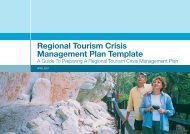Tourism Risk Management - Sustainable Tourism Online
Tourism Risk Management - Sustainable Tourism Online
Tourism Risk Management - Sustainable Tourism Online
Create successful ePaper yourself
Turn your PDF publications into a flip-book with our unique Google optimized e-Paper software.
Best Practice<br />
Although such a global flu pandemic has not yet eventuated, this example of proactive crisis<br />
management is consistent with best practice measures. Utilizing experience, corporate knowledge<br />
and a collaborative approach, this adaptation of scenario planning has assisted the Scottish tourism<br />
sector and businesses to become more aware, prepared, and confident in the advent of such a<br />
potential crisis. This case study highlights the potential for application in the operation and<br />
management of any tourism destination.<br />
(Source: Page, et al, 2006)<br />
3. Response<br />
The crisis response strategy includes actions taken leading up to and immediately after the impact of<br />
a crisis, to minimize its effects and to manage the consequences. The tasks involved will depend<br />
upon the nature and the extent of the crisis, but if a destination is experiencing a crisis imposed by a<br />
disaster impacting upon the community, the responsibility for management tasks related to the<br />
protection of lives and property will rest with the disaster management agencies. The destination will<br />
liaise with those agencies and be part of a coordinated, integrated response to the disaster. It is<br />
important that the destination and tourism operators don’t undertake tasks which are the<br />
responsibility of emergency services or disaster management agencies.<br />
Where the destination is dealing with a business or organizational crisis, it will be necessary to<br />
identify business continuity objectives and strategies and to manage the implementation of the crisis<br />
management plan. In order for visitors to maintain confidence in the destination, it is important that<br />
normal business operations and services are not neglected, but are continued with the least<br />
disruption possible. Effective crisis response management depends upon trained and experienced<br />
personnel with the capacity and flexibility to react to whatever situation the crisis presents.<br />
Importantly, the destination’s crisis management team will need an accurate picture of how the crisis<br />
has affected people, facilities, infrastructure and operations in order to make decisions and decide<br />
upon priorities. It may be necessary to task personnel to carry out a survey and assessment to obtain<br />
the specific information required for decision-making purposes, including:<br />
• effects of the crisis upon visitors;<br />
• damage to property and infrastructure;<br />
• disruption to services;<br />
• consequences of the crisis for regional tourism and the surrounding community; and<br />
• the personnel, equipment and measures needed to deal with the crisis.<br />
Depending upon the nature of the crisis, the destination may need to establish and maintain<br />
communication with key government and community leaders. Where possible these people should<br />
be included in crisis management exercises to allow liaison and communication links with them to be<br />
practised.<br />
<strong>Tourism</strong> <strong>Risk</strong> <strong>Management</strong> – An Authoritative Guide to Managing Crises in <strong>Tourism</strong> 59
















